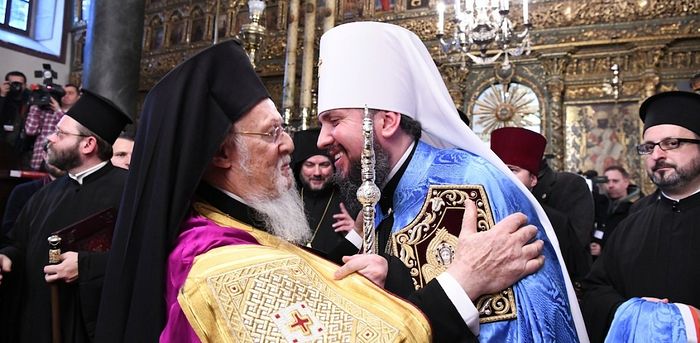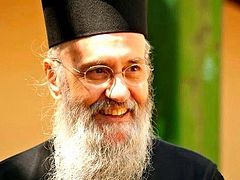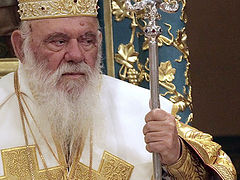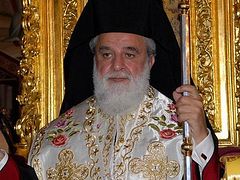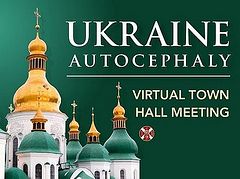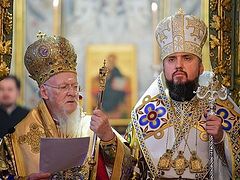Athens, September 19, 2019
Background
One of the biggest battlegrounds in the Ukrainian Church Crisis has been whether or not the Church of Greece will recognize the Ukrainian schismatics.
The latest news on the matter came on August 29, when it was reported that the Holy Synod of the Church of Greece recognizes the right of the Phanar to “grant autocephalies” but also stopped short of specifically recognizing the Ukrainian schismatics.
The issue of recognizing the schismatic OCU within the Greek Church is highly polarizing, unlike in the Polish or Serbian Churches where there is virtual unanimity among the bishops.
Some individuals within the Greek Church apparently support the schismatics, though this support primarily appears to be more out of loyalty and agreement to the Phanar rather than personal love for the schismatics; support is notably strongest in the New Lands territories of the Greek Church, which is canonically both under the Church of Greece and Constantinople.
One Greek Hierarch of the New Lands actually served with the schismatic primate, which caused the schismatics to proudly declare that the Greek Church now de-facto recognizes them, a claim which the Greek Church was forced to clearly refute.
There are also certainly voices in the Church of Greece which clearly support canonical order, and oppose recognizing the schismatics.
Many Greek Hierarchs have already outright condemned the schismatics, such as Metropolitans Seraphim of Piraeus (and here) Nektarios of Corfu, Paxoi, and the Diapontian Islands, Seraphim of Kythira, and Ambrose of Kalavryta. The Metropolis of Piraeus has also called upon the Synod not to recognize the Ukrainian schismatics.
Most notably, a powerful open letter to the Holy Synod signed by now reportedly over one thousand Greek people was released, begging the Holy Synod not to recognize the schismatics.
The Greek Holy Synod has been postponing taking up the issue, and in January reported that they would be referring the matter to the entire Bishop’s Council, which would include every hierarch of the Church of Greece, unlike the Holy Synod which is only a select executive body. Still, it was then reported the issue would not be on the agenda of the next Bishop’s Council in October.
According to Greek news, His Beatitude, Archbishop Ieronymos of Athens, wisely and humbly noted that this is not an issue for one man, at a time when throughout the world, Orthodox primates, hierarchs, clergy, and experts have been calling for this issue to be solved in a conciliar, synodical, pan-Orthodox format. “I cannot take on such responsibility alone,” His Beatitude allegedly said, preferring instead to entrust the issue to the Bishops’ Council.
Fr. Theodore Zisis, a Greek expert on the situation, who has spoken against Constantinople’s actions, stated prior to this that the Archbishop essentially reached a dead end on the issue.
An opinion arose among some experts that seeing as the question is essentially an issue for all of global Orthodoxy, it is in fact not a terrible idea for the Greek Church to simply postpone the issue, if the expected resolution will cause a scandal, and leave the issue for a pan-Orthodox body which they could participate in.
Nevertheless, the Greek Synod previously appointed two commissions to study the Ukrainian issue, on dogmatic and canonical issues, and on inter-Orthodoxy and inter-Christian relations. It was their findings, arguments, and recommendations of these commissions in particular that interested many observers.
It has been reported for months that both commissions would recommend recognizing the OCU and that the Greek hierarchs are likely to acquiesce to the will of Constantinople and recognize the OCU, however at the most recent Synod meeting, according to a source in Church circles, both committees, in fact, came out against the possibility of recognizing the OCU as an autocephalous Church, noting their serious objections.
Recently, however, a Greek source published an article stating that the committees did in fact support recognizing the schismatics, as described in an article by Marina Zioziou.
Four Arguments of the Greek Commissions in support of recognizing the schismatic OCU
While it is noted that officially, the Greek commissions have kept their reports a closely-guarded secret and have not commented on them, as previously noted, there were claims for months that they would support recognizing the schismatics.
According to sources from the Greek news agency Ethnos.gr, the commissions did support recognizing the schismatics, and specifically, there were four key arguments, which the site notes allegedly have much in common with the recommendation of the noted professor Vlasios Pheidas (name transliterated in other articles as Vlasios Fidas).
Here are the four key arguments Ethnos.gr noted, in summary:
-
Ukraine was never the canonical territory of any would-be Local Church save for the Ecumenical Patriarchate.
This argument has been refuted by several noted theologians. The letter of Greek clergy and laity, signed by multiple archimandrites alone, notes that several officials of the Ecumenical Patriarchate in fact have recognized Ukraine as the canonical territory of the Moscow Patriarchate, after the reunification in 1686, such as Basilios Stavridis (Chalki) and Gregorios Laurentzakis (Vienna).
This also includes Metropolitan Kallistos (Ware), the famous Oxford trained English theologian who made it clear on two separate occasions that he considers Ukraine to be a part of the Moscow Patriarchate, despite he himself being a hierarch of Constantinople.
Professor Theodore Zisis also wrote a paper explaining how Ukraine is a territory of the Russian Church, and despite the Greek article citing Vlasios Pheidas in defense of argument 1), Fr. Theodore in fact believes the work of Pheidas proves the contrary.
-
The Ecumenical Patriarch has always had, and still has the right to accept or reject the appeals given to him by bishops of other Local Churches (in other words, the Ecumenical Patriarchate claims to be the court of final appeal for all of Orthodoxy.)
This argument stems from Constantinople’s infamous and possibly willful misinterpretation of the 9th and 17th Canons of the Fourth Ecumenical Council. This argument is heavily tackled in this article, and refuted by the 12th-century expert Zonaras and the 18th-century St. Nicodemus of the Holy Mountain in the Pedalion, the book of canon law.
Zonaras specifically says, “the Patriarch of Constantinople is not sent as judge over all Metropolitans without exceptions—just only over his subordinates.”
St. Nicodemus goes on to clarify: “Constantinople has no authority to officiate in the dioceses and parishes (or districts) of the other Patriarchs, nor has this Canon given him the right of final appeals in the whole church.”
-
The Ecumenical Patriarch has the canonical right to grant autocephaly, and he has the duty to do everything to prevent threats and division of the ecclesiastical body.
There is no argument against the right of Constantinople to grant autocephaly to his own subordinates, or to universally-accepted canonical bodies on neutral territory who have not been defrocked by another Local Church.
The letter of Greek clergy and laity which opposed recognizing the schismatics, in fact, recognized that Constantinople in principle, has the ability to grant autocephaly. Arguments can be made about the diaspora here, however in principle, this is not what sparked the issue, but rather to whom Constantinople granted “autocephaly.”
The letter, and so many other experts noted that the canonical Ukrainian Church did not request or receive this autocephaly, but instead, defrocked and self-ordained schismatics were “granted autocephaly.” As a result, a group of violent, Nazi-supporting schismatics were given this status, whereas the canonical Church remained happily, although persecuted by those schismatics, in her position.
In fact, as many experts have noted in detail, the autonomous status of the Ukrainian Orthodox Church actually enjoys more freedoms than the so-called “autocephalous” unrecognized schismatic OCU; so much so, that even His Beatitude Metropolitan Onuphry of Kiev and All Ukraine, well-known for his soft-spoken nature, said that the schismatics received a tomos of slavery, not autocephaly.
It was noted, in fact, by experts that the autonomous Ukrainian Orthodox Church even has more freedoms than Constantinople granted to the Church of Greece when it gave autocephaly, specifically citing the independent canonization of saints. The UOC does not require Moscow’s direct consent to canonize saints, whereas Greece must send their lists for approval to Constantinople, just like the schismatic OCU was required by Pat. Bartholomew.
So, while autocephaly can only be granted to an actual Church in the first place, the autocephaly Constantinople grants comes with less freedoms than Moscow’s autonomy, and it’s disingenuous to argue this violent schism is healing division, when it’s the source of the problem.
-
In granting autocephaly, Constantinople must check the recipients for Apostolic Succession, yet it is noted Constantinople has the right to receive schismatics, restoring them to their previous ecclesiastical ranks.
This topic was touched upon by the esteemed Ukrainian Archpriest and Doctor of Theology Fr. Rostislav Yarema, in an article criticizing the non-canonical ordination of “Metropolitan” Makary Maletich. While it is noted that it is within the practice of the Orthodox Church to receive non-Orthodox clergy considered to have apostolic succession, i.e. Roman Catholics, into Orthodoxy “by vesting,” receiving defrocked schismatics is an entirely different matter. It was never the Orthodox practice to receive those defrocked by another Local Church, much less without repentance.
Moreover, many individuals in the schism, as noted by both Fr. Rostislav, and the letter of Greek clergy and laity, were “consecrated” or trace their lineage to a former deacon, previously jailed for child molestation, who pretended to be a bishop—Viktor Chekalin.
As a result, many members of this web of schisms, including “Metropolitan” Makary, were never at any time canonical hierarchs, and therefore possessed no Apostolic Succession in a clerical rank to which they can be restored.
They would effectively have to be re-ordained, even though this also is unlawful and anti-canonical, and that does not even speak for the people they themselves ordained. The OCU leader himself, Epiphany, was ordained by Philaret at a time when they were both recognized as schismatics by Constantinople, which is why Philaret himself said that if he was ever under anathema, then Epiphany is therefore not even a priest.
The Council of Bishops of the Greek Orthodox Church will meet again in October, and Abp. Ieronymos will reportedly broach the issue then.
Matfey Shaheen

